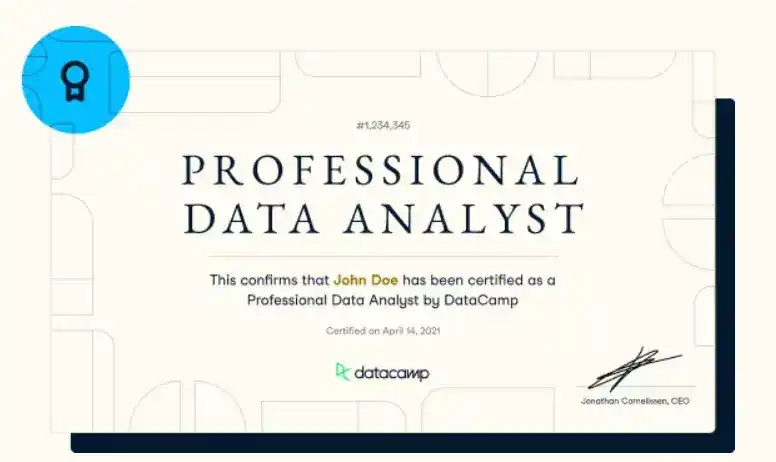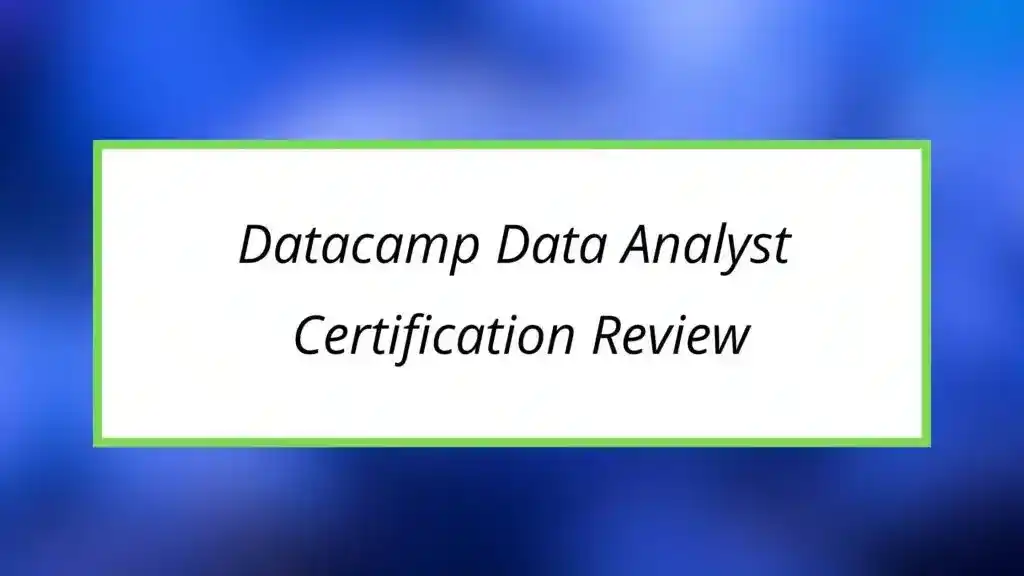Are you planning to enroll in Datacamp Data Analyst Certification and looking for Datacamp Data Analyst Certification Review?… If yes, then wait…first, read my in-depth Datacamp Data Analyst Certification Review and then decide whether to enroll in the program or not.
So, let’s get started-
Datacamp Data Analyst Certification Review
Understanding the Basics

Who’s It For?: The DataCamp Data Analyst Certification is designed to be inclusive. It welcomes all individuals, regardless of their level of experience. There are no strict prerequisites, making it accessible to newcomers and seasoned data enthusiasts alike.
The Certification Process: The certification process is a journey comprising several components:
Online Tasks: These tasks are timed, and they cover various aspects of data analysis, including data management, exploratory analysis, analytics fundamentals, data communication, coding for production, and statistical experimentation. What sets this certification apart is its flexibility.
You can choose to work in either Python or R for analytics fundamentals and exploratory analysis. SQL skills play a crucial role in data management. The practical exam is the final hurdle, where you’ll be evaluated on your ability to analyze data and effectively communicate your findings. This comprehensive evaluation ensures that both your technical abilities and soft skills are thoroughly assessed.
Personal Experience and Insights
Understanding what the certification involves is essential, but it’s also valuable to hear from those who have experienced it.
Personal Experience: As someone well-versed in data analysis, I found the certification to be hands-on and practical. The tasks were designed to mirror real-world scenarios, and the practical exam, focusing on communication skills, was particularly impressive. It’s not just about crunching numbers; it’s about translating those insights into understandable, actionable information.
Insights from Certified Professionals: Interviews with individuals who have already earned this certification reinforced my positive impressions. They emphasized that this certification goes beyond just technical skills. It equips individuals with the ability to effectively communicate their data-driven insights, turning data into a compelling narrative that can drive decision-making in organizations.
What You’ll Learn
Data Management
- This module teaches you how to navigate data systems efficiently and extract meaningful insights.
Exploratory Analysis
- Choose Python or R to dive deep into data exploration, and understanding patterns and trends.
Analytics Fundamentals
- Covers the core principles of analytics, providing a strong foundation for data analysis.
Data Communication
- Focuses on visualizing, reporting, and effectively communicating your data findings.
Coding for Production
- This module emphasizes the importance of writing clean and efficient code for data analysis.
Statistical Experimentation
- Put your skills to the test by analyzing information and conducting statistical experiments practically.
Pros and Cons:
Let’s take a closer look at the advantages and disadvantages of pursuing this certification.
The Pros:
- Real-World Relevance: This certification covers a wide spectrum of skills and knowledge that are highly sought after by employers in the data analysis field. It’s not just theoretical; it’s practical and immediately applicable.
- Flexibility: The certification allows you to choose your preferred programming language, either Python or R, for certain sections, making it adaptable to your skills and preferences.
- Community Access: One of the valuable benefits of this certification is the access it provides to the DC Certified Community. It’s a network that connects you with fellow data professionals, industry leaders, and a wealth of resources that can aid in your career development.
The Cons:
- Online Assessment: If you prefer traditional in-person exams, this online format may not align with your preference.
- Self-Paced Nature: Being a self-paced certification, it puts the onus on you to manage your study schedule and stay disciplined.
How It Helps Your Career
How can this certification help your job prospects?
By holding the DataCamp Data Analyst Certification, you become a more attractive candidate for data jobs that are in demand. Employers like people who can work with data and explain what it all means.
Preparation Tips
Preparation is a pivotal step in your certification journey. Here are some detailed tips:
- Skills Assessment: Before you begin your certification journey, assess your current data analysis skills. Identify your strengths and weaknesses to plan your study strategy effectively.
- Programming Language Choice: Decide whether you’d like to work with Python or R for analytics fundamentals and exploratory analysis. Choose the one that aligns with your comfort and expertise.
- SQL Mastery: If you’re not well-versed in SQL, invest time in mastering this fundamental data language, as it’s a critical component of the certification.
- Leverage DataCamp Resources: DataCamp offers a comprehensive range of courses and practice projects to help you prepare. Take advantage of these resources to build your expertise.
Price
Money matters, right? DataCamp has free stuff, but there’s also a paid option at $25 per month if you want more. The certification process has additional fees. The good news is, it’s not too expensive.
Certification Renewal: Is It Necessary?
One less thing to worry about is certification renewal. Once you’ve earned the DataCamp Data Analyst Certification, it’s yours for life. There’s no need to go through a renewal process.
Is Datacamp Data Analyst Certification worth it?
Yes, getting the DataCamp Data Analyst Certification is a good idea. It teaches you useful skills that employers like, such as working with data and explaining it. You can pick Python or R, which is handy. Plus, you join a group of other data people for help and resources. While there’s a cost, it’s not too high, and it’s a one-time thing.
Review Summary
| Certification Name | DataCamp Data Analyst Certification |
|---|---|
| Who’s It For? | Anyone can join, whether you’re new to data or experienced. It’s inclusive. |
| How It Works | You’ll do online tasks with timers and a practical test. |
| Skills Assessed | You’ll be tested on real-world skills: data management, exploring data, analytics basics, explaining data, coding, and experimentation. |
| Language Options | You can pick between Python or R for some parts, based on what you like. |
| Soft Skills Evaluated | They check how well you explain what you find in data. |
| Pros | – You learn what’s really used in jobs- You can choose your preferred language- You get access to a community for help and resources. |
| Cons | – The test is online, which might not suit everyone- You have to stay on track with self-paced study. |
| Career Benefits | It makes you more attractive to employers for data jobs. |
| Preparation Tips | – Check your skills- Pick a language- Learn SQL- Use DataCamp’s resources to prepare. |
| Costs | The costs are reasonable, including exam fees. |
| Certification Renewal | No need to renew; it’s a one-time certification. |
| Verdict | It’s a valuable and practical certification that enhances your data skills and job opportunities. |
Conclusion
I hope this Datacamp Data Analyst Certification Review helps you to decide whether to enroll or not. If you have any questions, feel free to ask me in the comment section. I am here to help you.
Happy Learning!
FAQ
You May Also Be Interested In
10 Best Online Courses for Data Science with R Programming
8 Best Free Online Data Analytics Courses You Must Know in 2025
Data Analyst Online Certification to Become a Successful Data Analyst
8 Best Books on Data Science with Python You Must Read in 2025
14 Best+Free Data Science with Python Courses Online- [Bestseller 2025]
10 Best Online Courses for Data Science with R Programming in 2025
8 Best Data Engineering Courses Online- Complete List of Resources
Thank YOU!
To explore More about Data Science, Visit Here
Though of the Day…
‘ It’s what you learn after you know it all that counts.’
– John Wooden
Written By Aqsa Zafar
Founder of MLTUT, Machine Learning Ph.D. scholar at Dayananda Sagar University. Research on social media depression detection. Create tutorials on ML and data science for diverse applications. Passionate about sharing knowledge through website and social media.

